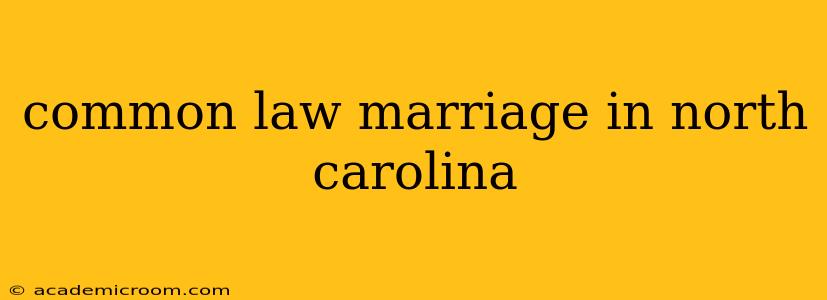North Carolina, unlike many other states, still recognizes common-law marriages, also known as informal marriages. However, it's crucial to understand that establishing a valid common-law marriage in North Carolina requires meeting specific legal criteria. This comprehensive guide will delve into the intricacies of common-law marriage in the state, clarifying misconceptions and providing essential information for those considering or currently in such a relationship.
What Constitutes a Common-Law Marriage in North Carolina?
A common-law marriage in North Carolina isn't simply living together. To be legally recognized as married without a formal ceremony, you must meet three key requirements:
-
Cohabitation: You and your partner must live together as husband and wife. This isn't just about sharing a residence; it's about presenting yourselves to the world as a married couple.
-
Mutual Agreement: You and your partner must mutually agree to be married. This agreement doesn't need to be formalized in writing or witnessed; however, proving this mutual agreement is crucial if the marriage is ever challenged. Evidence of this agreement might include joint bank accounts, shared property ownership, or consistent representations to friends, family, and the community that you are married.
-
Public Declaration: You and your partner must publicly represent yourselves as husband and wife. This could involve introducing each other as spouse, filing joint tax returns, or using the same last name.
When Does a Common-Law Marriage Begin in North Carolina?
A common-law marriage begins on the date you and your partner meet all three requirements outlined above – cohabitation, mutual agreement, and public declaration. It's not a gradual process; there's a specific point in time when the marriage legally commences. This date is important for determining issues related to property division, inheritance, and spousal support in the event of separation or death.
How to Prove a Common-Law Marriage in North Carolina?
Proving a common-law marriage in North Carolina can be challenging. While there's no formal registration process, you'll need substantial evidence to demonstrate that you met the three requirements. This evidence might include:
- Testimony from witnesses: Friends, family members, and neighbors who can attest to your presentation as a married couple.
- Financial records: Joint bank accounts, insurance policies listing each other as beneficiaries, joint tax returns, and shared property deeds.
- Photos and videos: Images and recordings that depict you as a couple presenting yourselves as married.
- Correspondence: Letters, emails, or cards referring to each other as spouses.
What Happens if a Common-Law Marriage Ends in North Carolina?
The dissolution of a common-law marriage in North Carolina follows similar legal processes as a formal marriage. This means separation, divorce proceedings, and potential issues relating to child custody, child support, spousal support (alimony), and property division will be addressed through the court system.
Can I End a Common-Law Marriage Without Going to Court?
While a formal separation agreement can be drafted, dissolving a common-law marriage often involves court proceedings. This is particularly true when significant assets are involved or disputes arise regarding child custody or support. Consult an attorney to understand your options and potential legal pathways.
Are There Any Disadvantages to a Common-Law Marriage in North Carolina?
While a common-law marriage offers certain benefits, there are also potential drawbacks:
- Difficulty proving the marriage: As discussed, establishing the existence of a common-law marriage requires strong evidence.
- Uncertainty regarding property rights: Without a formal marriage contract, resolving property disputes can be more complicated.
- Issues with inheritance: Establishing inheritance rights might be more challenging without formal documentation.
Is it Better to Have a Formal Marriage Than a Common-Law Marriage in North Carolina?
A formal marriage provides greater legal certainty and clarity regarding your rights and responsibilities. It's generally advisable to formalize your marriage through a legal ceremony to avoid potential complications down the line.
Can a Common-Law Marriage Be Retroactively Recognized in North Carolina?
A common-law marriage can't be retroactively created. The three requirements (cohabitation, mutual agreement, and public declaration) must have existed concurrently for the marriage to be legally valid.
This information is for educational purposes only and should not be considered legal advice. Consult with a qualified North Carolina attorney for advice specific to your situation. The laws surrounding common-law marriage can be complex, and seeking professional legal counsel is crucial to ensure your rights are protected.
